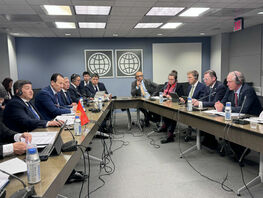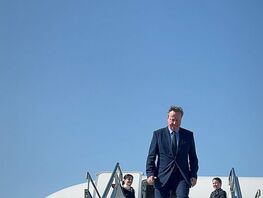Olivia Stevens, Senior Adviser for Central Asia for EducationUSA program, came to Kyrgyzstan for a while, but stayed forever, having met her life partner here. She told in an interview with 24.kg news agency how the family of her future husband perceived her, what surprised her in the country and how one can get an education in the United States.
— Can you tell about your work in Kyrgyzstan? Has the pandemic somehow affected it, added challenges that had to be addressed?
— The program EducationUSA provides free resources to local people hoping to study in the U.S., as well as to American institutions hoping to recruit students in our countries. EducationUSA provides services to students, parents, and teachers across the countries we work in, so the pandemic has affected a lot of our activities. While informational sessions, trainings, and events have been shifted online, restrictions on in-person activities have made some of our activities take a different shape. For instance, this year my EducationUSA colleagues Bermet Biyaly kyzy, Nargiza Kanybek kyzy, and I have worked on developing an online platform with video courses and resources to take the place of in-person activities (myeducationusa.online). We’ve also shifted a lot of our attention to reaching our audience on social media.
— How many Kyrgyz citizens were able to get an education in the United States thanks to the program? In general, is it difficult to do it?
— As of 2019, there were 290 Kyrgyz citizens studying in the U.S., and trends show that those statistics are increasing.
Each year thousands of visitors attend EducationUSA events such as the annual Fair (this year to be held online on November 7) or come directly to the EducationUSA center in Bayalinov Library. Unfortunately, we don’t always know the end result when a student or a school English teacher comes in for advice or resources. It’s always great to have alumni of our programs or former advisees stay in touch, and we try to stay in touch with our group participants even after they go to university.
Study in the U.S. can be challenging it’s true — the process is competitive, especially for financial aid, and can seem extremely complicated when compared with applying to university locally. However, I’ve had many different kinds of students successfully study in the U.S. — even those with lower marks, or a lower level of English.
The largest challenge I see is a lack of information - and that’s exactly the issue our program seeks to address.
— Tell a little about yourself, where were you born, raised, educated?
— I’m from Glenmoore, Pennsylvania — a rural area. After finishing school, I studied at Dickinson College — a liberal arts institution not far from where I grew up. Dickinson was actually the first college to be founded after the independence of the United States in 1783. In my third year at university, I lived in Moscow and studied at the Russian State University for the Humanities before finishing my studies in the U.S.
— How did you end up in Kyrgyzstan? What did you know about the country before coming to it?
— I came to Kyrgyzstan as a Fulbright Student Research Fellow to take case studies of the family members of Kyrgyz citizens working abroad in Russia. I knew a bit about Kyrgyzstan, since an alumnus of my university had done research her as well, and helped me to find contacts. I also knew a number of Kyrgyz people when I lived in Moscow. I think though that with any country or people it takes a long time to really learn much.
— Do you remember your first impressions of Kyrgyzstan? Did something surprise you then?
My very first surprise on arriving was the irrigation canal beside the sidewalks in Bishkek! I was very surprised with Bishkek in general — the layout, architecture, and different zones within the city made a large impression on me.
Olivia Stevens
— As far as I know, you found a life partner here. Tell us how you met, how did the relatives of your future husband perceive you, how did you enter the family, did you have any difficulties? How did your family members react to your decision?
— I met my husband Kanat soon after I arrived in Kyrgyzstan in 2013. One of my colleagues, who was studying snow leopards, came to the preservation summit in Bishkek, and we went together on a hike to the mountains with the Trekking Union. Kanat was the volunteer guide for that trip, and since my colleague had a lot of questions about the animals living in the area we spoke a lot as I translated and became friends quickly. My husband’s family is very warm and welcoming.
I’m very close to my mother in law and three sisters in law, and feel so lucky to have them as my family as well now.
Olivia Stevens
When I was a little girl I always liked the idea of having a large family and now my wish has come true. My parents, of course, wish that we could visit in person more often, but thankfully with airplanes and the Internet we can visit regularly and call each other on video every day.
— I love the fresh delicious produce. I try to prepare a variety of foods, and try new recipes. For me, learning to cook cooperatively with multiple other people was new and challenging, but is much more fun. Sadly, I’ve never made lagman noodles by hand even though my family loves lagman, so this is the next thing I hope to learn.
— Is there something that surprises in Bishkek and Kyrgyzstan?
— I’m always surprised by the incredible students and teachers we work with in Kyrgyzstan. In my current position I work with other Central Asian countries as well, but I have to admit that the young people in Kyrgyzstan always amaze me.
— In a lot of ways Bishkek is like a small town, despite being the capital city. It seems that everyone knows or is related to everyone else, and it’s common for strangers to chat or to help each other. This is very similar to the area that I grew up, and something I love about living here.
— What is your favorite place in the capital? What would you like to change in Bishkek to make the city better?
My favorite place in the capital is Bayalinov Library. It’s the home of the EducationUSA center, and I’ve spent many happy hours working there.
Olivia Stevens
I love my colleagues, the wonderful staff of the library, the building itself, its artworks, and the many different rooms and spaces it holds.
Bishkek I think suffers from problems that are common in all countries — unequal access to resources, be that utilities, services, education, or money.












